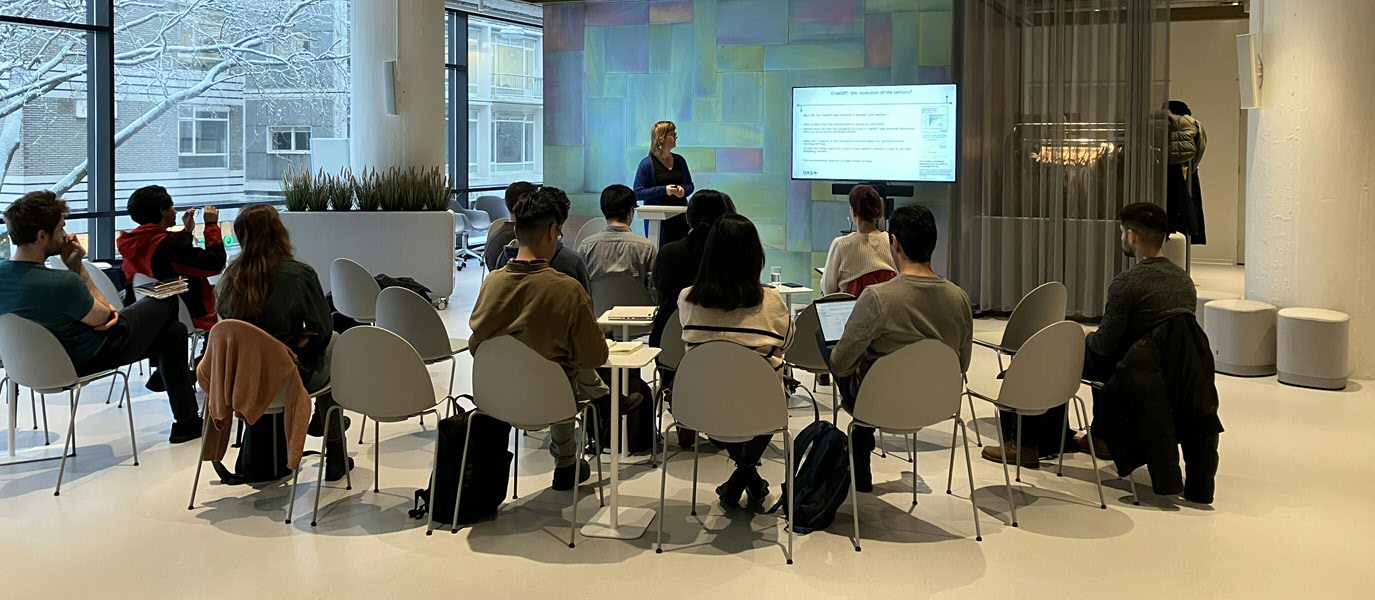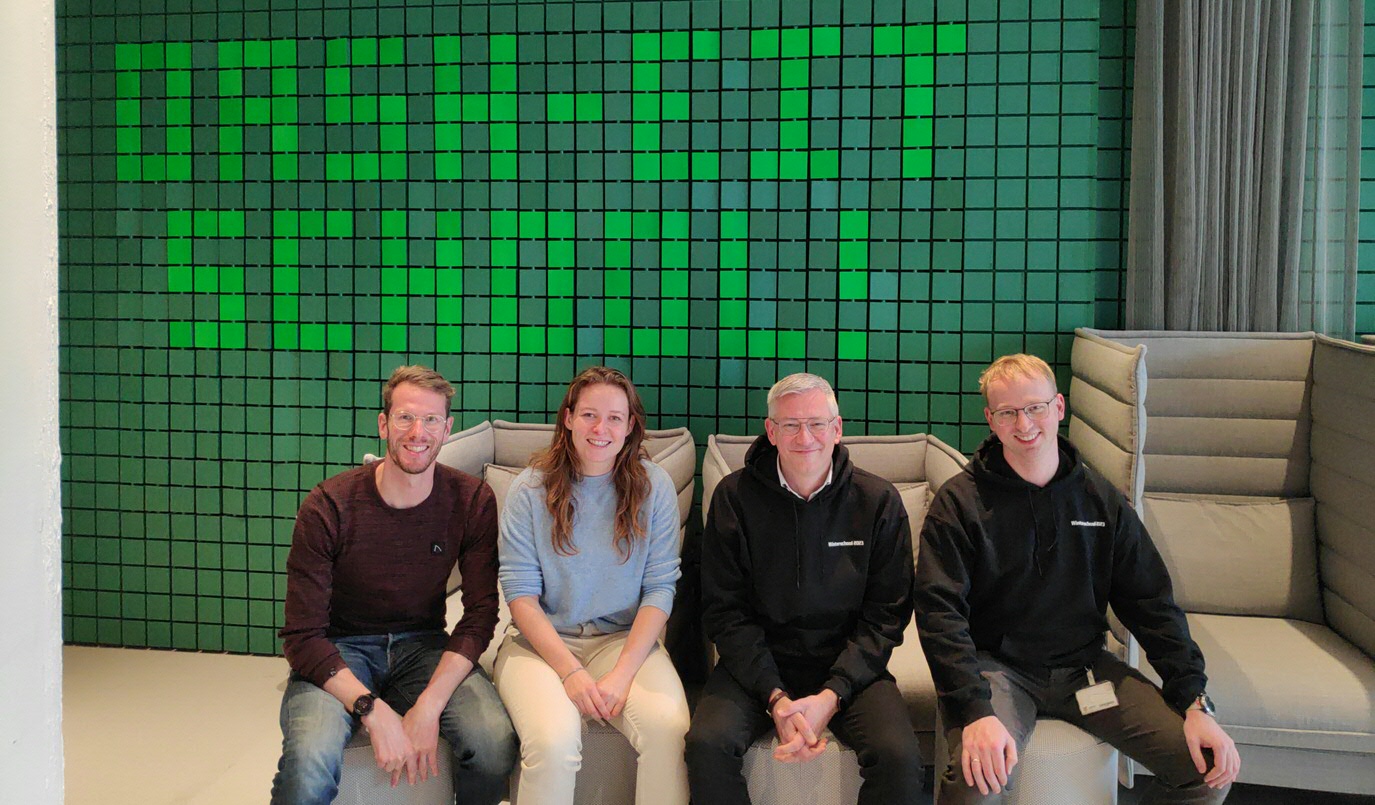Recap Winter School: 'A driver's licence for artificial intelligence and health'

During the winter school 'Data Science and AI in Health', which took place in December at the House of Connections, participants got a 'flying start' on artificial intelligence, health and startups. 'The diversity of the group of students was remarkable. This provided new perspectives, allowing participants to learn from each other.'
The winter school 'Data Science and AI in Health' was organised by the Data Science Center in Health (DASH), a knowledge institution of the University Medical Center Groningen (UMCG), and is part of the international consortium AIProHealth. The physical part took place in both Groningen and Tartu (Estonia). 'With the winter school, participants get a flying start in the field of health and AI,' says Rik Wisselink-Bijker, Educational content developer at DASH and organiser of the winter school. 'They also learn to put this knowledge into practice.'
Prior to the winter school, participants followed an online preparation, a so-called MOOC (Massive Open Online Course), where they learned, among other things, the principles of programming with Python. During the physical part, in Groningen and Tartu, the programme included various speakers and excursions. Participants also worked in groups on a case study. 'The students were given a dataset, supplied by the UMCG, to work on and devise the best solution together,' says Wisselink-Bijker.
He continues. 'Participants received the same case and datasets, but the groups could choose themselves how to solve a problem and which stakeholders they would serve with their solution.' After the physical winter school in Groningen, they will continue to work on the case together online until the holidays. 'It's basically a big hackathon, where the best idea wins in the end.'

Diverse
The diversity of the participants is remarkable, says Peter van Ooijen, coordinator of the winter school and Professor of AI in Radiotherapy, as well as theme coordinator at the Jantina Tammes School. 'The students and professionals are from various fields. We have people from technical backgrounds, as well as participants from legal or business disciplines. Moreover, the group is very international. I believe we have 13 different nationalities.'
During the winter school, everyone is welcome, Van Ooijen continues. 'Anyone interested in the topic of health and AI can join: from bachelors to postdocs, and people from the working field.' The diversity benefits the winter school, according to the professor. 'In the field, it is very important to connect the clinical with the technical, for example. Also, the international and interdisciplinary character creates new perspectives. People can therefore really learn from each other.'
The diversity also appeals greatly to winter school participant Federica Fontanella, aios and postdoc at the UMCG. 'There are people with a legal or technical background, but also young doctors. During the case study, you learn to work together with professionals from different backgrounds.'
Clinical evidence
The topic of health and AI has been getting a lot of attention lately. In research, artificial intelligence is widely used, Wisselink-Bijker knows. But in healthcare practice, the introduction of AI is proceeding more cautiously. 'You can now see the first steps, for example with ChatGPT writing letters to patients. Also, AI is being used in the radiotherapy department.'
At the same time, current regulations hamper the further introduction of artificial intelligence in healthcare, says Van Ooijen. 'If we want to implement AI in the long term, the added value has to be proved scientifically and we will have to collect clinical evidence. These elements will also be addressed during the winter school.'
'Black box'
Stefan Phillips, ceo of OneVision Healthcare, an organisation that supports healthcare startups, agrees. He gave one of the courses to students on the business side of AI and health. In his lecture, Phillips addressed the issue of how starting an 'ordinary' company differs from a startup in the field of health and AI. According to him, AI innovations in healthcare have a long 'lead time'. 'That is, it takes a long time to get a product on the market because of strict regulations.'
Healthcare companies also have to deal with the so-called 'black box', Phillips continues. 'Even if AI solves a problem better than humans, patients often prefer human interaction. That has to do with trust.' Lastly, funding is a challenge, the business expert knows. 'In healthcare, it is mostly about reimbursements, for example by health insurance companies. That's why funding works differently from an ordinary startup.'
Driver's licence
How about med school? Within the curriculum artificial intelligence is still limited, Van Ooijen knows. ‘It is something we are working on as DASH, though, and we expect to start with the first courses in 2024. Obviously, not every doctor needs to become an AI engineer. But if we want to apply AI, a basic understanding is required. To drive a car, you don't need to know exactly how the engine works, but you do need to have a driver's licence.'
Winter school participant Diana Andrade agrees that basic knowledge about artificial intelligence is very important. She has a background in law and works in the pharmaceutical industry. 'If we want to regulate AI, we need to understand how it is created. That, to me, is a major added value of this winter school.'

The winter school 'Data Science and AI in Health' took place at the House of Connectionsand was co-organized by the Jantina Tammes School of Digital Society, Technology and AI. Curious about the topic? Next summer there will be an AIProHealth Summer School. The summer school in Groningen will take place from 22 to 26 July and the hackathon from 29 July to 9 August. More information can be found on the AIProHealth website.
More news
-
15 September 2025
Successful visit to the UG by Rector of Institut Teknologi Bandung

